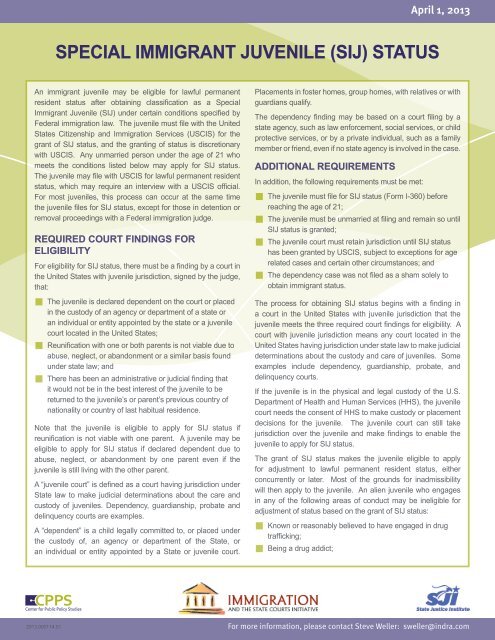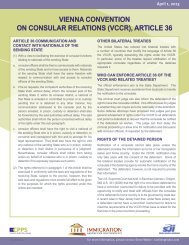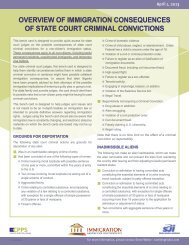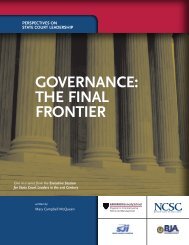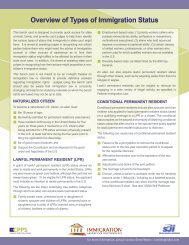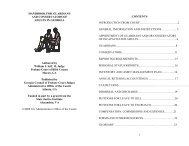SPECIAL IMMIGRANT JUVENILE (SIJ) STATUS
SPECIAL IMMIGRANT JUVENILE (SIJ) STATUS
SPECIAL IMMIGRANT JUVENILE (SIJ) STATUS
You also want an ePaper? Increase the reach of your titles
YUMPU automatically turns print PDFs into web optimized ePapers that Google loves.
DRAFT<br />
April 1, 2013<br />
<strong>SPECIAL</strong> <strong>IMMIGRANT</strong> <strong>JUVENILE</strong> (<strong>SIJ</strong>) <strong>STATUS</strong><br />
An immigrant juvenile may be eligible for lawful permanent<br />
resident status after obtaining classification as a Special<br />
Immigrant Juvenile (<strong>SIJ</strong>) under certain conditions specified by<br />
Federal immigration law. The juvenile must file with the United<br />
States Citizenship and Immigration Services (USCIS) for the<br />
grant of <strong>SIJ</strong> status, and the granting of status is discretionary<br />
with USCIS. Any unmarried person under the age of 21 who<br />
meets the conditions listed below may apply for <strong>SIJ</strong> status.<br />
The juvenile may file with USCIS for lawful permanent resident<br />
status, which may require an interview with a USCIS official.<br />
For most juveniles, this process can occur at the same time<br />
the juvenile files for <strong>SIJ</strong> status, except for those in detention or<br />
removal proceedings with a Federal immigration judge.<br />
Required Court Findings for<br />
Eligibility<br />
For eligibility for <strong>SIJ</strong> status, there must be a finding by a court in<br />
the United States with juvenile jurisdiction, signed by the judge,<br />
that:<br />
QQ<br />
The juvenile is declared dependent on the court or placed<br />
in the custody of an agency or department of a state or<br />
an individual or entity appointed by the state or a juvenile<br />
court located in the United States;<br />
QQ<br />
Reunification with one or both parents is not viable due to<br />
abuse, neglect, or abandonment or a similar basis found<br />
under state law; and<br />
QQ<br />
There has been an administrative or judicial finding that<br />
it would not be in the best interest of the juvenile to be<br />
returned to the juvenile’s or parent’s previous country of<br />
nationality or country of last habitual residence.<br />
Note that the juvenile is eligible to apply for <strong>SIJ</strong> status if<br />
reunification is not viable with one parent. A juvenile may be<br />
eligible to apply for <strong>SIJ</strong> status if declared dependent due to<br />
abuse, neglect, or abandonment by one parent even if the<br />
juvenile is still living with the other parent.<br />
A “juvenile court” is defined as a court having jurisdiction under<br />
State law to make judicial determinations about the care and<br />
custody of juveniles. Dependency, guardianship, probate and<br />
delinquency courts are examples.<br />
A “dependent” is a child legally committed to, or placed under<br />
the custody of, an agency or department of the State, or<br />
an individual or entity appointed by a State or juvenile court.<br />
Placements in foster homes, group homes, with relatives or with<br />
guardians qualify.<br />
The dependency finding may be based on a court filing by a<br />
state agency, such as law enforcement, social services, or child<br />
protective services, or by a private individual, such as a family<br />
member or friend, even if no state agency is involved in the case.<br />
Additional Requirements<br />
In addition, the following requirements must be met:<br />
QQ<br />
The juvenile must file for <strong>SIJ</strong> status (Form I-360) before<br />
reaching the age of 21;<br />
QQ<br />
The juvenile must be unmarried at filing and remain so until<br />
<strong>SIJ</strong> status is granted;<br />
QQ<br />
The juvenile court must retain jurisdiction until <strong>SIJ</strong> status<br />
has been granted by USCIS, subject to exceptions for age<br />
related cases and certain other circumstances; and<br />
QQ<br />
The dependency case was not filed as a sham solely to<br />
obtain immigrant status.<br />
The process for obtaining <strong>SIJ</strong> status begins with a finding in<br />
a court in the United States with juvenile jurisdiction that the<br />
juvenile meets the three required court findings for eligibility. A<br />
court with juvenile jurisdiction means any court located in the<br />
United States having jurisdiction under state law to make judicial<br />
determinations about the custody and care of juveniles. Some<br />
examples include dependency, guardianship, probate, and<br />
delinquency courts.<br />
If the juvenile is in the physical and legal custody of the U.S.<br />
Department of Health and Human Services (HHS), the juvenile<br />
court needs the consent of HHS to make custody or placement<br />
decisions for the juvenile. The juvenile court can still take<br />
jurisdiction over the juvenile and make findings to enable the<br />
juvenile to apply for <strong>SIJ</strong> status.<br />
The grant of <strong>SIJ</strong> status makes the juvenile eligible to apply<br />
for adjustment to lawful permanent resident status, either<br />
concurrently or later. Most of the grounds for inadmissibility<br />
will then apply to the juvenile. An alien juvenile who engages<br />
in any of the following areas of conduct may be ineligible for<br />
adjustment of status based on the grant of <strong>SIJ</strong> status:<br />
QQ<br />
Known or reasonably believed to have engaged in drug<br />
trafficking;<br />
QQ<br />
Being a drug addict;<br />
2013.000114.01<br />
For more information, please contact Steve Weller: sweller@indra.com
DRAFT<br />
QQ<br />
Having engaged in prostitution;<br />
QQ<br />
Violation of protection order;<br />
QQ<br />
Use of false documents; or<br />
QQ<br />
Having a mental condition that is a threat to others.<br />
Violent offenses, sex offenses, and gang activity are particularly<br />
problematical, as they often can lead to denial of any immigration<br />
benefit.<br />
The Issue of Age<br />
To assure that the juvenile remains eligible for <strong>SIJ</strong> status, the<br />
juvenile court must retain jurisdiction until the juvenile is granted<br />
<strong>SIJ</strong> status. If juvenile jurisdiction terminates at age 18 under<br />
state law, USCIS will not deny the petition if the record shows<br />
that the termination of jurisdiction was solely due to age.<br />
While a person under the age of 21 may file for <strong>SIJ</strong> status under<br />
Federal immigration law, some states do not permit a finding of<br />
dependency for a person who has reached the age of 18. In<br />
those states a person who has not been declared dependent<br />
before reaching the age of 18 will not be eligible to apply for <strong>SIJ</strong><br />
status.<br />
For proof of age, USCIS regulations provide that the applicant<br />
submit documentary evidence of the alien’s age, in the form of<br />
a birth certificate, passport, official foreign identity document<br />
issued by a foreign government, such as a Cartilla or a Cedula,<br />
or other document which in the discretion of the director<br />
establishes the beneficiary’s age.<br />
The Effects of Juvenile Delinquency<br />
Proceedings<br />
A delinquency court can be the source of findings making a<br />
juvenile eligible for <strong>SIJ</strong> status.<br />
A juvenile delinquency determination is not considered an adult<br />
criminal conviction.<br />
QQ<br />
What constitutes juvenile delinquency is to be determined<br />
by Federal law.<br />
QQ<br />
Federal law defines a juvenile as anyone under the age<br />
of 18, and juvenile delinquency as an act committed by a<br />
juvenile that would be a crime if committed by an adult.<br />
QQ<br />
Certain crimes committed by juveniles may be considered<br />
adult criminal convictions under Federal law<br />
Juvenile delinquency proceedings may still carry risks for a<br />
juvenile. The disqualifying factors for adjustment of status<br />
listed above do not require a criminal conviction to make an<br />
alien inadmissible or deportable, so a juvenile who admits to<br />
any of those areas of conduct in the context of a delinquency<br />
proceeding may then be ineligible for adjustment of status.<br />
Note that a juvenile who engages in prostitution may be eligible<br />
for a T Visa, as a juvenile who engages in commercial sex can<br />
be considered a victim of a severe form of trafficking without<br />
having to show coercion under Federal law.<br />
Further, USCIS may look at evidence of bad acts, including<br />
evidence from a delinquency proceeding, in determining<br />
whether to exercise discretion on behalf of an applicant for a<br />
variety of forms of discretionary immigration relief, including<br />
naturalization.<br />
Engaging in Prostitution<br />
Engaging in prostitution can make a juvenile ineligible for<br />
adjustment of status, even if the juvenile’s behavior is not<br />
classified as criminal under state law. On the other hand, the<br />
juvenile may be eligible for a T visa under 8 U.S.C 1101(a)(15)<br />
(T) as a victim of a severe form of trafficking as defined by the<br />
Trafficking Victims Protection Act (TVPA), 22 U.S.C 7102 and<br />
7105.<br />
Effect on Family Immigration<br />
A person who becomes a Lawful Permanent Resident through<br />
<strong>SIJ</strong> status will no longer be considered the child of his or her<br />
parents for immigration purposes, even if parental rights were<br />
not terminated. The child will thus not be able to use the<br />
lawful status attained through <strong>SIJ</strong> status as a means to obtain<br />
lawful status for his or her parents. This bar applies to both<br />
parents, even if <strong>SIJ</strong> status was obtained due to abuse, neglect,<br />
or abandonment by only one parent. It also applies even if<br />
parental rights were not terminated.


